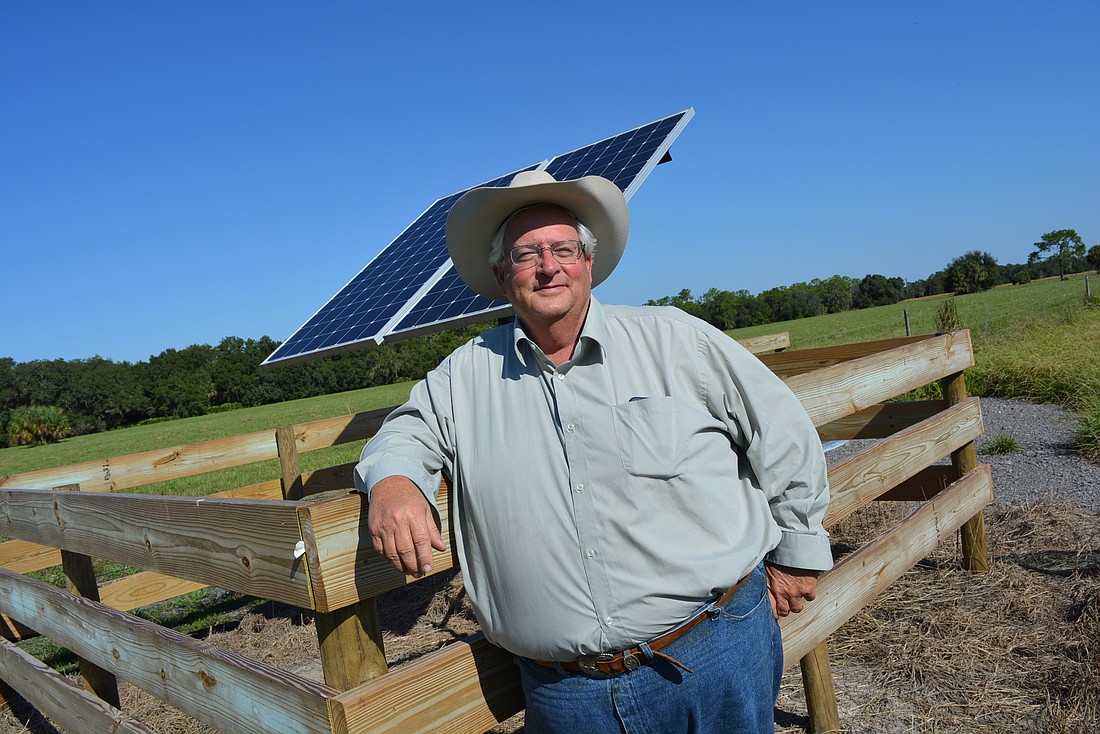- February 5, 2026
-
-
Loading

Loading

Wearing his cowboy hat, cattle rancher Jim Strickland rolled through pastureland on the 4,500-acre Blackbeard’s Ranch in eastern Manatee County in his pickup truck.
He nodded toward the window.
About 50 feet away, deer walked along the tree line, barely noticing the truck had stopped. On the other side of a fence, another deer bounded across the open field.
“Look at that,” he said, smiling. “A good cattle ranch is conducive to a great wildlife base.”
Strickland said the property is also home to panthers, gopher tortoises and up to 170 species of birds. The variety of grasses, plants and wetlands work together to create a diverse, food-rich environment.
Strickland, a lifelong Manatee County resident and managing partner of Blackbeard’s Ranch, is working to preserve nature. In 2018, the National Resources Conservation Service, an agency within the U.S. Department of Agriculture, purchased a “wetland reserve easement” on about one-third of the Blackbeard property for $3.9 million. It guarantees the land will be saved from development.
“There are not many options for owners of big tracks of land except to sell them to developers,” Strickland said.
Strickland said such programs funded by the state Legislature provide an alternative to keep land in its natural state. With conservation and other types of easements, green space is guaranteed to the public in future generations and also compensates the ranchers financially. Such a deal, which brings about half the money the land would be worth on the open market, also benefits the environment because it preserves natural habitat and allows the land to continue slowing and filtering water.
Strickland serves on the board of directors for The Florida Conservation Group, which focuses on conservation of Florida’s ranchlands and other working lands. It advocates, educates and acts as a resource on land protection and other conservation programs for protecting wildlife and water.
“We try to advocate for conservation programs throughout the state,” Strickland said. “The big picture is for other ranchers to be sustainable.”
He hosts groups and educational events at the ranch to talk about such conservation initiatives and water quality.
On Sept. 24, Manatee County commissioners recognized Strickland for being named sustainable rancher of the year by Audubon Florida. The award is given annually to a rancher who has demonstrated exemplary and environmentally sustainable ranching practices and who tries to conserve native wildlife habitat.
“He’s really taken the lead in our area with conservation for farming,” Manatee County Commissioner Vanessa Baugh said. “I admire him greatly for the stances he’s taken.”
Audubon Florida Everglades Science Coordinator Paul Gray said Strickland’s leadership has been outstanding in promoting ways to conserve Florida’s ranches and farmlands.
“He could be doing a lot of different things, and he’s trying to do things that are good for the future of Florida, not necessarily his pocket book,” Gray said. “People with that type of attitude are very valuable in our society. He’s taken a leadership role in trying to promote easement programs and getting conservation status.”
Strickland said he believes in property rights and is not against development. However, he also believes in providing options to landowners and hopes to create ways to preserve ranch lands and improve water quality.
For example, he said a wetland area called Dancing Moon Marsh at Blackbeard’s Ranch is not only a great habitat but also a natural water filtration system. It and other systems on the ranch slow water and filter it before it reaches tributaries and rivers leading to the bay.
“We put mini dams throughout the ranch to slow the water,” he said.
With 50-50 grants from the Florida Department of Agriculture and Consumer Services, he has installed two solar wells and has two more planned. Each costs in total $9,000 and pumps water directly into water troughs for the cattle as needed.
He also has six windmills on the property to generate power.
Strickland said his work isn’t out of the ordinary.
“There are a lot of people doing as good as me,” Strickland said. “There are a lot of people doing better than me.”
Gray said Strickland’s leadership in environmental issues is what separates him. Strickland’s product diversification is also unique. He has expanded his ranching operations to offer Mangalitsa pigs (a Hungarian breed of domestic pig) and is working to make mead and honey for sale in the future.
Strickland grew up in west Bradenton surfing as child, but his family always had cattle. He rode horseback starting at age 6 and started working as a cowboy at 8.
“We spent days in the woods together, gathering cattle off the larger pieces [of land],” he said. “Back then, all the cowboys were great woodsman. They had to track the cattle.”
Strickland said those days in the woods instilled in him a love of nature and an understanding of the importance of how ranchers must work in harmony with the environment.
“If we change the environment, let’s change it for the better.” Strickland said.